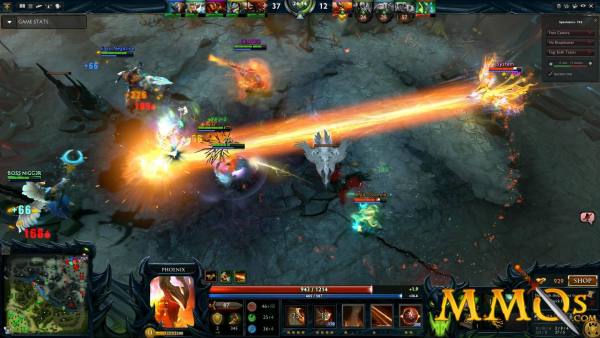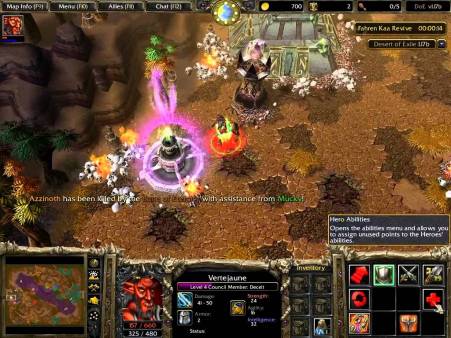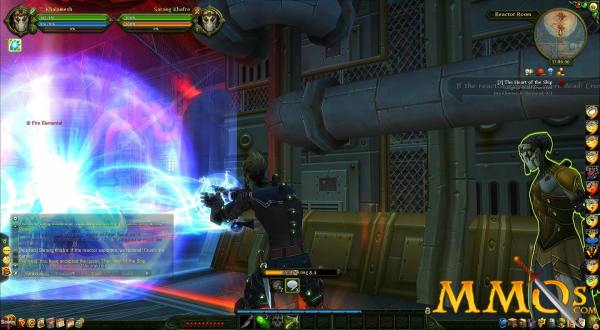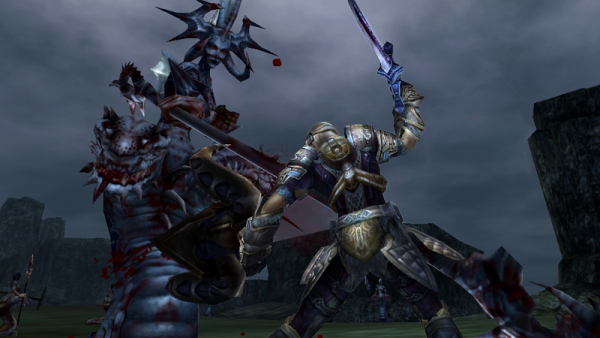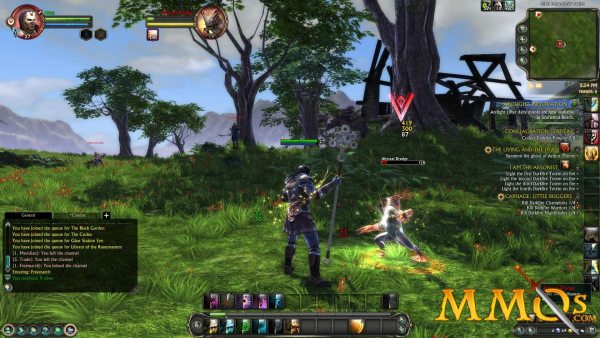6 Game Mechanics that Popular MMOs Should Borrow

Sometimes leaving a good impression can mean more than the overall quality of a game, which is coincidentally something I tell myself to reconcile the fact that I played World of Warcraft by myself for 7 months during the Burning Crusade. The reality is that games don’t survive on good impressions alone, which has caused many great idea to be buried alongside the games that housed them. It’s common practice for game developers to borrow ideas from other games, but for one reason or another the following mechanics and design philosophies have yet to be rediscovered by the mainstream gaming industry. All I can hope for now is that a popular game like World of Warcraft or DOTA 2 will step up and perform game design necromancy on some of my favorite MMOs.
Dual Classing, Guild Wars 1
Guild Wars 2's release marked an unfortunate shift from it's predecessors novel class system. Dual-classing provided players the opportunity to create a vast array of character archetypes, from warrior monks to necromancer rangers, in a way that was neat and easily understood. Each of those classes unlocked access to a specific set of skills, while the primary class also offered access to a unique attribute. Each skill took up one slot on the player’s hotbar, with a maximum limit of eight active abilities, which created gameplay that felt similar to constructing a deck in a collectible card game like Magic the Gathering. Guild Wars 1 players picked skills for their build before going out on missions and quests rather than having 200 unique abilities that filled up their user interface, which meant that picking a specific build for your class combination was almost as important as how you performed on the battlefield.
I’ve yet to see any character progression system that matches Guild Wars 1 in either elegance or diversity. There is something to the idea that games can stand as pillars of great design without being constantly reproduced, but it’s been ten years since ArenaNet’s first MMO was released and it’s clear that they have no interest in revisiting one of my favorite mechanics. It’s high time that someone takes the dual classing system and improves on it.
Conditions, Desert of Exile
Let’s stay on the Guild Wars train for a moment and lament the fact that no one remembers Desert of Exile. The game, created by one of my favorite map makers from the Warcraft 3 community, was one of the best examples of what MOBAs could be before the mainstream community discovered them and decided to give them a horrible new name. While I’m still waiting for an MMORPG to adopt more ideas from Guild Wars, Desert of Exile has already shown how great ArenaNet’s condition system could be in a DOTA-esque shell. Each character applied and prolonged conditions on their enemies, creating gameplay that was both elegantly simple and strategically deep, without the need to memorize hundreds of different debuffs. Items were similarly designed, acting alongside the condition system rather than trying to introduce too many extra mechanics for players to memorize. Rising_Dusk melded a niche MMORPG with what was an even more niche genre at the time and created one of my favorite games. Sadly, there’s no one left on Battle.net that remembers DoE, so it’s up to mainstream developers to take this concoction of great ideas and run with it.
Precasting, Allods Online
Let’s jump to a game that people may actually still be playing, so that I don’t completely sound like a hipster living in the glory of games gone by. Allods Online was an MMORPG that had a huge amount of potential and failed to live up to expectations. One particularly interesting mechanic that caught my attention while trudging through the world of Allods was the ability for mages to prepare their spells before battle. It may not seem like a big deal, especially for players accustomed to instant cast spells with low cooldowns, but precasting seems like a mechanic with a lot of design space, meaning that the idea could potentially lead to other cool designs within the parameters it establishes. Imagine being able to prepare a fireball with a 3 or 4 second cast time before jumping into a PvP bout and blasting the first opposing player you meet in the face. A healer could precast a heal and hold it for when their allies urgently needed assistance. Precasting perfectly exemplifies why great ideas don’t necessarily need to come from successful games, and why other developers should keep on the lookout for the diamonds in the rough of MMO design.
Turning Everything to 11, Advent of the Zenith
I admit that this is a bit of a stretch, considering that it is more of a game design philosophy than a specific mechanic, but I couldn’t resist bringing it up. I honestly wonder whether I’m the last person on earth that remembers Advent of the Zenith, a popular AoS (which is what we used to call MOBAs) from Rising_Dusk that competed with Dota Allstars during Warcraft 3’s golden years. AoTZ wasn’t a masterpiece of programming (hello, Chaos Bug), or the most balanced game ever (hello, legitimately half of the cast), but what it lacked in approachability it made up for in pure unadulterated fun. Each hero had something about them that might seem incredibly overpowered in any other game, making each match feel like a battle between gods, rather than a skirmish between mere mortals.
The issue here is not that other MOBAs aren’t fun to play, but rather that none of the games I’ve played since AoTZ had the guts to give players access to incredibly powerful abilities. Instead of gaining a shield that blocks damage and provides additional movement speed (as you may find in the likes of League or HoTS), the Celestial Seeker summons a barrage of meteors that fall from the sky while he recites a poem, which culminates in his death (unless the player is very tricky) and the death of just about everything else on screen. Similarly, the Ronin has a deadly combination of abilities that can potentially result in him killing almost any opponent in one hit, provided he prepares beforehand.
This may sound silly to modern MOBA players who are used to a certain hero power level, but AoTZ balances itself out by giving everyone access to ridiculously strong abilities. Besides, I’m not looking for League of Legends or DOTA 2 to borrow from AoTZ, because the mechanics wouldn’t work in those environments. Instead, I’d prefer to play a new MOBA that is focused on creating the kind of gameplay that makes heroes actually feel like heroes.
Horror Themed Mechanics, Requiem
Requiem was a popular free to play MMORPG that prided itself on its horror theme. Players were allowed to transform into horrific demons and were tasked with fighting “nightmare” monsters during specific times of day. The demon transformation mechanic has been seen in other MMOs before and after, most recently with Devilian, but I’ve yet to find an MMORPG that so fully embraces grotesque horror. Thankfully, Requiem only touched the surface of the design space available to them, which gives me hope that there will come a time when I can play a MMORPG that devotes itself to creating a similar atmosphere.
Instant Adventure, Rift
Rift was, and in some ways still is, a great game, but I can say with certainty that it no longer lives up to its former glory. I’m struggling to find reasons to log on and my toons are getting lonely, so I fear that it may be time for other developers to start salvaging parts from Trion’s first MMO. If I had my way someone would develop a new game that borrows nearly everything from Rift, but I don’t think that’s realistic. Instead, I’d suggest that developers look into adopting Rift’s Instant Adventure feature. IA allows players to press a button and be instantly teleported to somewhere in Telera to complete a chain of quests with a randomly selected group of players. The mechanic initially restricted users to zones in their level bracket, but Trion has improved the feature to scale players to whatever zone they are randomly placed in. There is even an Instant Adventure tool specifically for players that want to complete raid content, albeit with severely stripped down mechanics and encounters.
The randomness and simplicity of Instant Adventure may not be for everyone, but it does solve a significant problem for the MMORPG community, namely that a majority of players do not have the time to invest in more complex content. If I have fifteen minutes before I have to leave for work and I want to play Rift, I can sit at the auction house and sell crafting materials or I can go on an epic adventure to defeat an ancient god with a raid group. The issue is that I don’t always want to play Rift anymore, so I end up wasting that time twiddling my thumbs in other games, rather than having fun.
I’d prefer if MMO devs gave a reasonable grace period before scavenging dead games for good ideas, but at the same time it baffles me just how often great designs are left in the ashes of once popular games. I’m sure I’ve missed plenty of fantastic mechanics from other MMOs that I’ve either never played or have forgotten about, but that’s where you come in. Let me know if I’ve missed any mechanics that have been ignored by modern game devs and deserve a second chance in the limelight.
